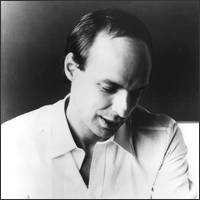BORN: Woodbridge, Suffolk, England, 15 May 1948
Brian Eno was a founder member of Roxy Music, manipulating sounds on their debut album and the legendary For Your Pleasure. Leaving Roxy Music in 1973, he began his solo career with the album Here Come The Warm Jets. Eno has released a string of critically acclaimed records, and over the years his work has been compiled on two 'Best Of's and three Boxed Sets. As well as Eno's own albums, he has collaborated with the likes of John Cale, Nico, Robert Fripp and the band James. His co-writing and playing on David Bowie's Low, "Heroes" and Lodger helped define the sound of this classic trilogy. After having produced U2's The Joshua Tree, Unforgettable Fire, Zooropa and Achtung Baby, he formed a loose collective with members of the band and other artists (including Luciano Pavarotti and Howie B.) to write and record Passengers: Original Soundtracks 1 released on Island Records (October 95).
Brian Eno is also one of the most significant record producers of our age. His ability to steer artists into radical new areas was first made obvious on the three albums he made with Talking Heads, culminating in Remain in Light in 1980. By this time he had also produced the seminal compilation of New York's New Wave, No New York, and Devo's Q: Are We Not Men? A: We Are Devo. In the 1980s he applied his gear-changing skills to U2, helping an already great stadium rock band turn into the most original and creatively challenging mega-band since The Beatles. Other production credits range from Real World artist Geoffrey Oreyema to the band James as well as singer Jane Siberry and performance artist Laurie Anderson. In 1994/95 he returned to one of his most famous collaborators, producing Bowie's Outside.
A pioneer in tape-looping and other early forms of sonic manipulation, Eno's work with Robert Fripp in the early 1970s ('No Pussyfooting' and Evening Star), signalled a determination to look beyond the conventional song format. His unusual, strategic approach to music-making (more likely to involve drawing a diagram than writing down chord changes) was made clear with the 1975 publication of Oblique Strategies - a set of problem-solving cards for artists. Also in 1975, Eno released Discreet Music, naming the new genre he had discovered 'ambient'. Bringing the ideas of John Cage to a pop audience, the true significance of Eno's landmark ambient releases (including Music for Airports and Thursday Afternoon) only became apparent in the early 1990s when ambient exploded into the charts and into a range of new hybrid musical forms.
Eno also pioneered sampling and the use of found sounds on My Life in the Bush of Ghosts, a collaboration with David Byrne released in 1981; again it would be some years before the rest of the world fully cottoned on to these ideas. Eno's instrumental works continue, with The Shutov Assembly released in 1992 and the minimal masterpiece Neroli in 1993. His composition for Derek Jarman's Glitterbug soundtrack was processed by Jah Wobble and released as Spinner in October '95.
